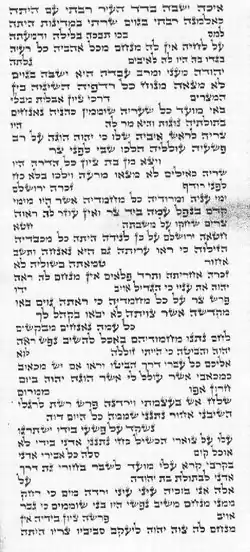Lamentations 5
Lamentations 5 is the fifth (and the last) chapter of the Book of Lamentations in the Hebrew Bible or the Old Testament of the Christian Bible,[1][2] part of the Ketuvim ("Writings").[3][4]
| Lamentations 5 | |
|---|---|
 A handwritten Hebrew scroll of Lamentations by the scribe Elihu Shannon of Kibbutz Saad, Israel (2010). | |
| Book | Book of Lamentations |
| Hebrew Bible part | Ketuvim |
| Order in the Hebrew part | 6 |
| Category | The five scrolls |
| Christian Bible part | Old Testament |
| Order in the Christian part | 25 |
Text
The original text was written in Hebrew language. This chapter is divided into 22 verses.
The fifth chapter (fifth elegy), though having 22 stanzas (the number of letters in the Hebrew alphabet) just as the first four, is not alphabetical and its lines are shorter than those of the others, which are longer than are found in other Hebrew poems.[5] Each line contains twelve syllables, marked by a cæsura about the middle, dividing them into two somewhat unequal parts.[5] This chapter serves as an epiphonema, or a closing recapitulation of the calamities treated in the previous chapters/elegies.[5]
This last chapter of the book is called "the Prayer of Jeremiah" in some Greek copies, and in the Latin Vulgate, Syriac, and Arabic versions.[6]
Textual versions
Some early witnesses for the text of this chapter in Hebrew are of the Masoretic Text, which includes Codex Leningradensis (1008).[7][lower-alpha 1] Fragments containing parts of this chapter were found among the Dead Sea Scrolls, i.e., 5Q6 (5QLama; 50 CE) with extant verses 1‑13, 16‑17.[9][10][11]
There is also a translation into Koine Greek known as the Septuagint, made in the last few centuries BCE. Extant ancient manuscripts of the Septuagint version include Codex Vaticanus (B; B; 4th century), Codex Alexandrinus (A; A; 5th century) and Codex Marchalianus (Q; Q; 6th century).[12][lower-alpha 2]
Verse 1
- Remember, O LORD, what is come upon us:
- consider, and behold our reproach.[14]
Verse 8
- Servants have ruled over us:
- there is none that doth deliver us out of their hand.[16]
"Servants", or "slaves" in the Revised Standard Version and the Jerusalem Bible, refers to "Chaldean officials".[17]
Verse 21

- Turn thou us unto thee, O Lord,
- and we shall be turned;
- renew our days as of old.[18]
- "Turn": the word that is also used in Lamentations 1:13; 3:40 has been in multiple messages from Jeremiah for his people to go back to God (Jeremiah 3:1; 3:7; 3:12; 3:14; 3:22; 4:1).[19]
- "Renew our days as of old": a request for "restoration" (compare Psalm 14:7; Psalm 90:13; Jeremiah 48:47; Zephaniah 3:14–20).[15]
Verse 22
KJV:
- But thou hast utterly rejected us;
- thou art very wroth against us.[20]
NKJV:
- Unless You have utterly rejected us,
- And are very angry with us![21]
Verse 22 in Hebrew
Masoretic text (from right to left)
- כי אם־מאס מאסתנו
- קצפת עלינו עד־מאד׃
Transliteration:
In many manuscripts and for Synagogue use, Lamentations 5:21 is repeated after verse 22, so that the reading does not end with a painful statement, a practice which is also performed for the last verse of Isaiah, Ecclesiastes, and Malachi,[22] "so that the reading in the Synagogue might close with words of comfort".[23]
See also
- Jacob
- Judah
- Jerusalem
- Zion
- Related Bible parts: Psalm 30, Isaiah 1, Jeremiah 3, Jeremiah 4
Notes
- Since 1947 the whole book is missing from Aleppo Codex.[8]
- Only Lamentations 1:1–2:20 are extant in the Codex Sinaiticus.[13]
References
- Collins 2014, pp. 365–367.
- Hayes 2015, Chapter 20.
- Metzger, Bruce M., et al. The Oxford Companion to the Bible. New York: Oxford University Press, 1993.
- Keck, Leander E. 2001. The New Interpreter's Bible: Volume: VI. Nashville: Abingdon.
- Jamieson, Robert; Fausset, Andrew Robert; Brown, David. Jamieson, Fausset, and Brown's Commentary On the Whole Bible. "Lamentations 5". 1871.
 This article incorporates text from this source, which is in the public domain.
This article incorporates text from this source, which is in the public domain. - Gill, John. Exposition of the Entire Bible. "Lamentations 5". Published in 1746-1763.
 This article incorporates text from this source, which is in the public domain.
This article incorporates text from this source, which is in the public domain. - Würthwein 1995, pp. 35–37.
- P. W. Skehan (2003), "BIBLE (TEXTS)", New Catholic Encyclopedia, vol. 2 (2nd ed.), Gale, pp. 355–362
- Ulrich 2010, pp. 753–754.
- "General Info". 5 January 2018.
- Fitzmyer 2008, p. 105.
- Würthwein 1995, pp. 73–74.
-
 This article incorporates text from a publication now in the public domain: Herbermann, Charles, ed. (1913). "Codex Sinaiticus". Catholic Encyclopedia. New York: Robert Appleton Company.
This article incorporates text from a publication now in the public domain: Herbermann, Charles, ed. (1913). "Codex Sinaiticus". Catholic Encyclopedia. New York: Robert Appleton Company. - Lamentations 5:1 KJV
- Coogan 2007, pp. 1178-1179 Hebrew Bible.
- Lamentations 5:8 KJV
- Jerusalem Bible (1966), footnote at Lamentations 5:8
- Lamentations 5:21 KJV
- The Nelson Study Bible. Thomas Nelson, Inc. 1997. ISBN 9780840715999. pp. 1330-1331.
- Lamentations 5:22 KJV
- Lamentations 5:22 NKJV
- Ellicott, C. J., A Bible Commentary for English Readers, on Lamentations 5:22. Arkose Press. 2015 [1878]. ISBN 9781345350784
- Skinner, J., Cambridge Bible for Schools and Colleges on Isaiah 66, accessed 1 July 2019
Sources
- Collins, John J. (2014). Introduction to the Hebrew Scriptures. Fortress Press. ISBN 9781451469233.
- Coogan, Michael David (2007). Coogan, Michael David; Brettler, Marc Zvi; Newsom, Carol Ann; Perkins, Pheme (eds.). The New Oxford Annotated Bible with the Apocryphal/Deuterocanonical Books: New Revised Standard Version, Issue 48 (Augmented 3rd ed.). Oxford University Press. ISBN 9780195288810.
- Fitzmyer, Joseph A. (2008). A Guide to the Dead Sea Scrolls and Related Literature. Grand Rapids, MI: William B. Eerdmans Publishing Company. ISBN 9780802862419. Retrieved February 15, 2019.
- Hayes, Christine (2015). Introduction to the Bible. Yale University Press. ISBN 978-0300188271.
- Ulrich, Eugene, ed. (2010). The Biblical Qumran Scrolls: Transcriptions and Textual Variants. Brill. ISBN 9789004181830. Retrieved May 15, 2017.
- Würthwein, Ernst (1995). The Text of the Old Testament. Translated by Rhodes, Erroll F. Grand Rapids, MI: Wm. B. Eerdmans. ISBN 0-8028-0788-7. Retrieved January 26, 2019.